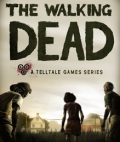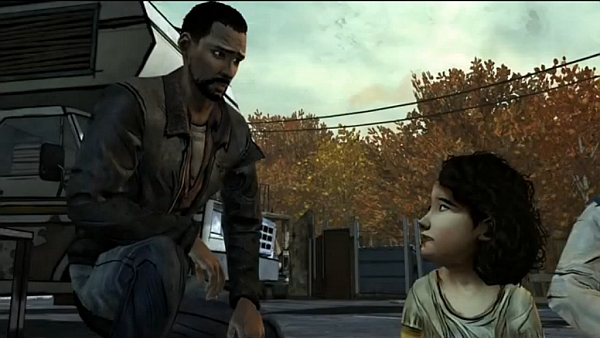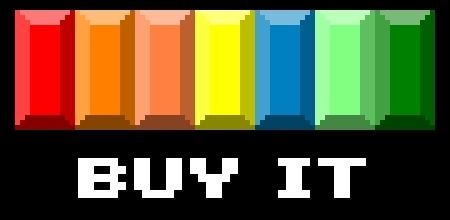
The strength or weakness of an episodic series is its ability to keep the player interested in doing the same things in new situations after a significant break. Enabling the player to care about the characters is another important factor as well. These are things previous episodic Telltale games have stumbled at a bit. Sam & Max don’t exactly change, nor are we embroiled in their dramatic arcs. Marty and Doc seem to be fairly static characters as well who are on a mission specifically to prevent or reverse any change that might occur. But the characters in The Walking Dead are involved in a drama that pulls the player forward in a way that Sam & Max and Back to the Future never quite managed.
Platforms: PC (Version Played), PS3, Xbox 360,
Publisher: Telltale Games
Developer: Telltale Games
Genre: Hillbilly Stereotype Reinforcer
Release Date: June 27, 2012 (XBLA), June 29, 2012 (PC, PSN)
ESRB Rating: Mature
 The second episode of the series, Starved For Help, opens with perhaps the worst writing that I’ve encountered in Telltale’s tenure (even going back to the Bone series). In a rather ham-fisted way, we are told that the characters we left in the previous episode, plus a new face, are hungry. Yep, they’re hungry, and that’s because they have no food. And that having no food, it’s led to them being hungry. Yep… they sure are hungry. Wouldn’t it be great to get some food?
The second episode of the series, Starved For Help, opens with perhaps the worst writing that I’ve encountered in Telltale’s tenure (even going back to the Bone series). In a rather ham-fisted way, we are told that the characters we left in the previous episode, plus a new face, are hungry. Yep, they’re hungry, and that’s because they have no food. And that having no food, it’s led to them being hungry. Yep… they sure are hungry. Wouldn’t it be great to get some food?
Fortunately, this clumsy bit of exposition is passed by quickly for a horrifying encounter immediately after, which I failed because I was earnestly trying every option except the most brutal. There were some terrible consequences, and then my group made it back to the motel, which is where we left our ragtag band of hungry folk at the end of last episode.
The story from this point revolves around two farmers who come to the motel, hoping to trade for gasoline for their generators. Lee, the main character, heads over to check it out with some others from the motel. After that, things get weird. I won’t spoil the game here, but there are some difficult and surprising choices that you have to make. Telltale does a good job of blindsiding you the way that the comic book series does. It also has you make choices through the quickness of your actions that can have serious consequences on the characters around Lee.
But as an adventure game, it is seriously lacking in the puzzle department. There are very few puzzles in this episode, and the ones that are here are so obvious that they can hardly be called puzzles at all. Instead, they are more along the lines of “here’s a problem, what would you use to fix it in the real world? OK, go find those things.”

While the game’s easy puzzles may seem like a better thing than the infamous Gabriel Knight fake mustache puzzle, the key to adventure gaming puzzles is to let you figure out what you would do in real life, and then to give it a little twist. (Here follows a ridiculously mild spoiler.) For example, one of the “puzzles” requires Lee to fix a broken swing. The swing is made of two ropes and a board. There’s a rope missing, and the board is broken. So what do you do? Get a board and a rope and presto chango, you have a swing. There are obvious ways to make the puzzles better without becoming ridiculous. Is another character using the saw that you need to trim the board? Have a discussion with him to get him to give you the saw. Can’t get the rope to go up over the branch? Tie a heavy enough rock to it.
Due to its lack of puzzles, the game rests mainly on dialog choices and exploration, with some key moments relying on your character having to spring into action. Therefore you’ll be moving Lee around environments, opening and closing things, talking to people, and generally finding items that will solve your puzzles for you when they show up. All of this is enjoyable because it functions to push the plot along, which is of course the main draw of this series.
The real wonder of this episode, and the series as a whole, is that I have no idea what the consequence of this first encounter would have been if I had done things differently. I could have gone back and started my game again, conscious of the outcome, but that would have ruined the experience. It’s appropriate that I wonder if the guy I was trying to save would have made it. Would another character have lived? Was I responsible for the death of a character later in the game? What if I had acted differently? What the Walking Dead series allows you to do is step into the main character’s shoes in a way that very few games allow. Consequence, that buzzword of the gaming industry now, is realized in some very special ways in this series, and continues very strongly in Starved For Help.
But The Walking Dead also brings something else to the table. The player doesn’t just experience consequence; he or she experiences just what Lee does: Self Doubt. This might be Telltale’s greatest contribution to gaming with The Walking Dead so far.

Review Disclosure: A review copy of The Walking Dead was provided by Telltale Games for the purposes of this review.






